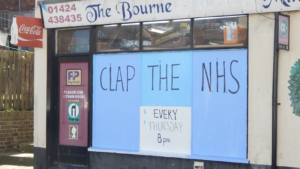Home » Commentary » Opinion » NHS now a UK religion
· Ideas@TheCentre
 It is just over 100 years ago that celebrated French sociologist Emile Durkheim published The Elementary Forms of the Religious Life (1917).
It is just over 100 years ago that celebrated French sociologist Emile Durkheim published The Elementary Forms of the Religious Life (1917).
Durkheim asked why every society develops some form of religion. He looked at the simplest society he could find — the Aboriginal clans in Australia — to find the answer.
The Australian clans identified themselves by sacred totems. A totem could be almost anything — an animal, a natural feature of the landscape. Its intrinsic character was unimportant. What mattered was that the totem represented the whole clan.
Totemic objects and symbols were set apart from everything else in the world and treated as sacred. For much of the year, clans were scattered, but when they reunited, the sacred objects would be retrieved, rituals would be performed, and there would be an eruption of what Durkheim called ‘collective effervescence.’ Individuals felt themselves in the presence of a transcendent power, greater than themselves. They attributed this power to the totem, but its source was really their society.
Durkheim argued it is this experience of belonging to something greater than ourselves which generates ‘religion.’ When we come together around sacred objects, we bind ourselves together and feel exhilarated. As he put it: “The idea of society is the soul of religion.”
Durkheim recognised that “the old gods are growing old,” but he insisted we’ll always create new ones. The Americans have their sacred flag. The Aussies, Gallipoli (and perhaps their cricket team). The Soviet Union had Lenin’s tomb. And the Brits have the National Health Service (NHS).
Ever since the coronavirus lockdown started, every Thursday at 8pm, the BBC has summoned people to come to their front doors and join in a collective celebration of the NHS. People clap, whoop and bang saucepans. Like those Aboriginal clans, they feel reinvigorated as they celebrate their three-letter totem.
Every developed country has a health care system, and everywhere people express gratitude to the medical professionals who risk their lives fighting this virus. But the Brits thank the NHS. They think this lumbering state bureaucracy has special powers, and that nowhere else in the world has anything like it.
For years some of us have been arguing that the NHS is a badly flawed system. It’s cripplingly bureaucratic and unresponsive; other countries have much better health outcomes. But nobody’s listening to that now. When you’re caught up in a religious fervour, all that matters is the collective effervescence. The NHS is Britain’s national religion.
NHS now a UK religion